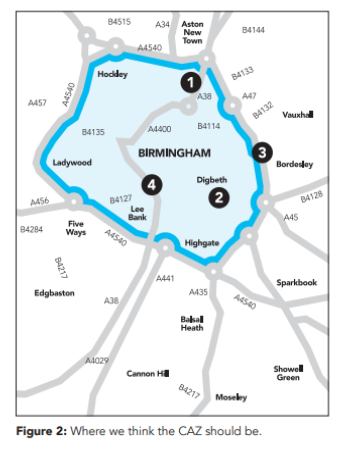UK's 2nd City Would Benefit from NGVs: Group
A consultation by the UK's second largest city Birmingham on how to clean up its air closes August 17; proponents of natural gas have said it can reshape the city's air quality and transport fleet.
Birmingham - along with a number of other UK cities - are expected by government to introduce a Clean Air Zone (CAZ) from January 2020. The motivation is strong in Birmingham, not least as it hosts the Commonwealth Games in 2022. The city council is considering the introduction of daily charges for entering the CAZ of £6-£12.50 for cars, £12.50 for vans and taxis, and £50-£100 for trucks and buses. London already levies slightly higher charges.
UK industry group Natural Gas Vehicle Network (NGVN) said August 17 it responded to the Birmingham consultation by arguing that switching diesel trucks and buses to natural gas will "bring huge air quality improvements" to Birmingham's streets. It calls for the targeting of action on diesel trucks and for greater levels of investment in public transport, so that more diesel heavy goods vehicles (HGVs) switch to natural gas instead.
Discussing its submission to Birmingham city council, NGVN chief executive Mike Foster said: "We believe that gas-powered HGVs are the only alternative to diesel HGVs, and the charge should specifically target Diesel HGVs in order to encourage businesses to switch. The aim of any clean air zone is to encourage a shift in behaviour and we believe this charge on HGVs should encourage companies to switch their fleet to lower emission gas-powered HGVs."
Just 6% of vehicle miles driven in the UK are by HGVs and buses, yet they are responsible for 48% of nitrogen oxides, said NGVN, yet HGVs and buses account for less than 2% of actual vehicles in the UK.
Foster said that Birmingham’s clean air zone "rightly targets the most polluting HGVs with higher daily charges" but said that NGVN would also like to see more investment in public transport and the creation of park-and-ride centres outside of the zone, but does agree with the boundaries of the zone proposed by Birmingham.
Clean air zones have been declared in other world cities, including Paris. Earlier this year a top German court ruled that Stuttgart and Dusseldorf may also legally ban older more polluting diesel cars from zones worst affected by pollution, thus overturning objections lodged in local courts by regional governments. The gas industry in Germany described that as a positive move. However last month it suffered a setback when Volkswagen, in what critics described as a short-sighted move, said it will temporarily suspend deliveries of new natural gas vehicles for several months until later in 2019.

Map shows where Birmingham city council believes its new Clean Air Zone for charging pollutive vehicles should be (Credit: the city council)



